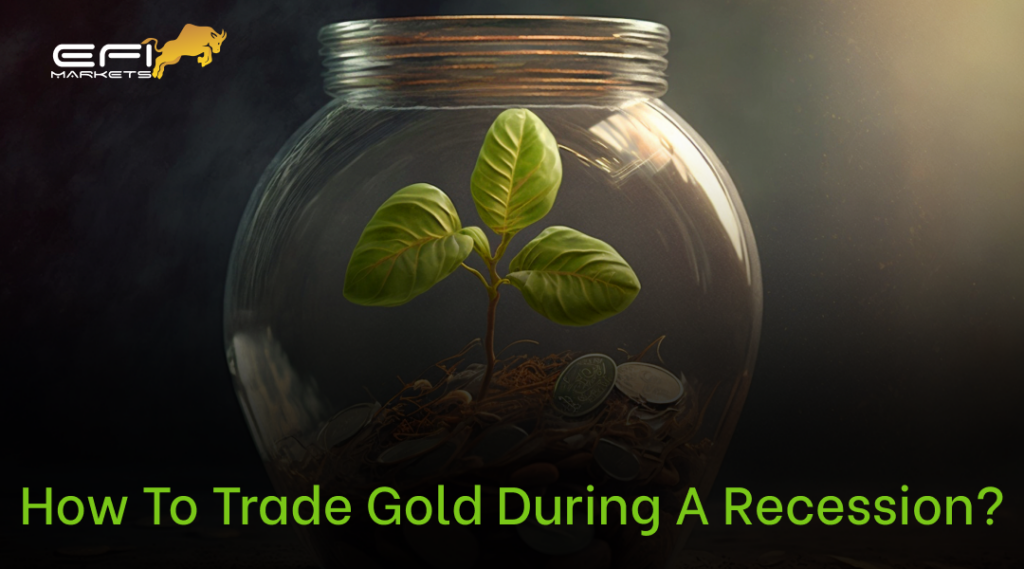How to trade gold during a recession?

For centuries, gold has been a highly sought-after commodity that has come to represent wealth, status, and stability. Its enduring allure has captivated people from all walks of life, making it a timeless symbol of prosperity and success. Gold has been a coveted and sought-after precious metal throughout history due to its scarcity and resilience. As a result, it has become a go-to option for investors, especially during periods of financial instability, such as economic downturns.
The correlation between gold and recessions is a fascinating and intricate topic, with various factors impacting their relationship. Gold prices tend to soar during economic downturns, and this phenomenon is not without reason. Gold is often considered a haven asset due to its ability to retain value during economic uncertainty. This precious metal has a reputation for being a reliable store of value, making it a popular choice for investors looking to protect their wealth.
During a recession, central banks may implement expansionary monetary policies that can cause paper currencies to lose value. Because of this, gold is often used to protect against inflation. This is because gold has historically maintained its weight over time, making it a reliable investment option. During a recession, the demand for gold tends to rise as investors look for ways to diversify their portfolios and minimize their exposure to volatile assets.
While gold is often associated with economic downturns, the correlation between the two is not always clear-cut. During an economic recession, gold prices can dip due to investors liquidating their assets or an uptick in the supply of gold.
We will examine the numerous variables that affect this correlation and how investors can utilize gold as a hedge against economic volatility as we delve deeper into the connection between gold and recessions in this blog. Join us as we delve into the fascinating world of gold prices during economic downturns. Discover the historical trends that have shaped the market and gain insights into what this could mean for future market trends.
The role of trading gold in economic recession: Why it performs well
Gold is viewed as a safe-haven asset by many investors during economic downturns. Why does gold serve as a safe haven for investors when the economy is in flux?
Gold’s long history as a reliable store of value and its consistent price over time are two contributing factors. Gold’s value is unaffected by inflation or other devaluation methods by governments, making it an attractive alternative to fiat currencies in economic uncertainty.
Gold’s appeal increases in economic uncertainty because of the metal’s traditionally held safe-haven status. Investors generally go for safer havens, like gold, when the stock and bond markets get too volatile. Gold’s low correlation with other assets, or its tendency to move independently of the stock market, makes it a helpful diversification tool.
Gold is also considered a hedge against currency devaluation and political instability. Due to its historically low volatility, gold is often used as a currency hedge during economic uncertainty. Gold’s reputation as a haven in times of conflict or political unrest also lends it the status of a potential political risk hedge.
Gold’s long history as a store of value, its perceived safe-haven status, low correlation with other assets, and capacity to hedge against currency and geopolitical risk all contribute to its strong performance during economic downturns.
How to trade gold during a recession
Gold is considered a safe investment, so buyers buy it when the economy doesn’t. When there is a slump, investors tend to buy more gold as a safe place to put their money. In the following section, we’ll talk about how to trade gold and use its benefits during a recession.
Discover the connection between gold and the economy:
Learn about the relationship between gold and the economy. When the economy is terrible, investors usually buy more gold because they want a safe way to spend their money. But other economic factors like inflation, interest rates, and the strength of the U.S. dollar also affect the price of gold. It is essential to keep an eye on these things to make intelligent trading choices.
Consider Investing in Gold ETFs:
Think about investing in gold ETFs. Gold exchange-traded funds (ETFs) are a way to invest in gold without owning gold in coins or bars. These funds follow the price of gold, making them more accessible and less expensive for buyers. SPDR Gold Shares (GLD) and iShares Gold Trust (IAU) are well-known gold ETFs.
Buy Physical Gold:
You can also buy real gold as coins or bars if you are an investor. This choice may cost more than investing in ETFs, but it gives investors a sense of protection because they own the gold. To ensure the gold is accurate, buying it from reliable dealers is essential.
Stay on Top of Market News:
You must stay on top of market news if you want to trade gold during a slump. Economic reports, news stories, and political events can change the price of gold. Investors should keep up with the news and change their trading tactics as needed.
Diversify your portfolio:
Even when buying gold, investors should think about diversifying their portfolios. Diversifying can help lower risk and boost profits. Investing in other safe assets like stocks or cash can help the portfolio be more well-rounded.
Wrap
When the economy is terrible, gold can be a safe place for buyers to spend money. When trading gold during a recession, it’s essential to understand the relationship between gold and the economy, buy in gold ETFs or physical gold, stay up-to-date on market news, and diversify the portfolio. Using these tips, investors can use gold to their advantage when the economy is unclear.


